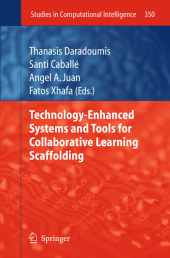 Neuerscheinungen 2013Stand: 2020-01-07 |
Schnellsuche
ISBN/Stichwort/Autor
|
Herderstra▀e 10
10625 Berlin
Tel.: 030 315 714 16
Fax 030 315 714 14
info@buchspektrum.de |

Santi CaballÚ, Thanasis Daradoumis, Angel A. Juan, Fatos Xhafa
(Beteiligte)
Technology-Enhanced Systems and Tools for Collaborative Learning Scaffolding
Herausgegeben von Daradoumis, Thanasis; CaballÚ, Santi; Juan, Angel A.; Xhafa, Fatos
2013. xvi, 312 S. 82 SW-Abb. 235 mm
Verlag/Jahr: SPRINGER, BERLIN 2013
ISBN: 3-642-26792-0 (3642267920)
Neue ISBN: 978-3-642-26792-5 (9783642267925)
Preis und Lieferzeit: Bitte klicken
Technology-enhanced systems and computer-aided tools that support scaffolding in collaborative learning are key goals in the education research sector. This book covers a number of approaches to fostering functional collaborative learning and working online.
Technology-Enhanced Systems and Tools for Collaborative Learning Scaffolding is a major research theme in CSCL and CSCW research community. This book presents up-to-date research approaches for developing technology-enhanced systems and tools to support functional online collaborative learning and work settings. It comprises a variety of research topics that span from the study of frameworks and infrastructures that foster collaborative learning and work through the application of different methods (distributed e-learning repositories, content creation and customization, social networks, collaborative ontologies building, and educational games) to the use of personalization and adaptation techniques to support the development of more powerful e-collaboration settings, including methodologies and tools for analyzing students┤ interactions with the aim to increase students┤ collaborative behaviors, performance and group organization. Researchers will find in this book the latest trends in these research topics, which gives them the opportunity to deepen further on the above issues and to extend their knowledge to other areas. Academics will find practical insights on how to use conceptual and experimental approaches in their daily tasks. Developers from CSCL community can be inspired and put in practice the proposed models and evaluate them for the specific purposes of their own work and context.
User-centred evaluation and organisational acceptability of a distributed repository to support communities of learners.- Facebook as a Collaborative Platform in Higher Education: the Case Study of the Universitat Oberta de Catalunya.- Development and Implementation of an Enterprise Learning Architecture for Collaborative Learning.- A rational framework for student interactions with collaborative educational systems.- Interaction analysis as a tool for supporting collaboration. An overview.- CLFP intrinsic constraints-based group management of blended learning situations.- A pedagogical approach for collaborative ontologies building.- A Model-Based Approach to Designing Educational Multiplayer Video Games.- A framework to foster collaboration between students through a Computer Supported Collaborative Learning environment.- Apt to Adapt: Micro- and Macro-Level Adaptation in Educational.- A Collaborative and Adaptive Design Pattern of the Jigsaw Method within Learning Design-Based E-learning Systems.- Recommendation of Learning Material through Students┤ Collaboration and User Modeling in an Adaptive E-learning Environment. -Modeling adaptation patterns in the context of collaborative learning: case studies of IMS-LD based implementation.


